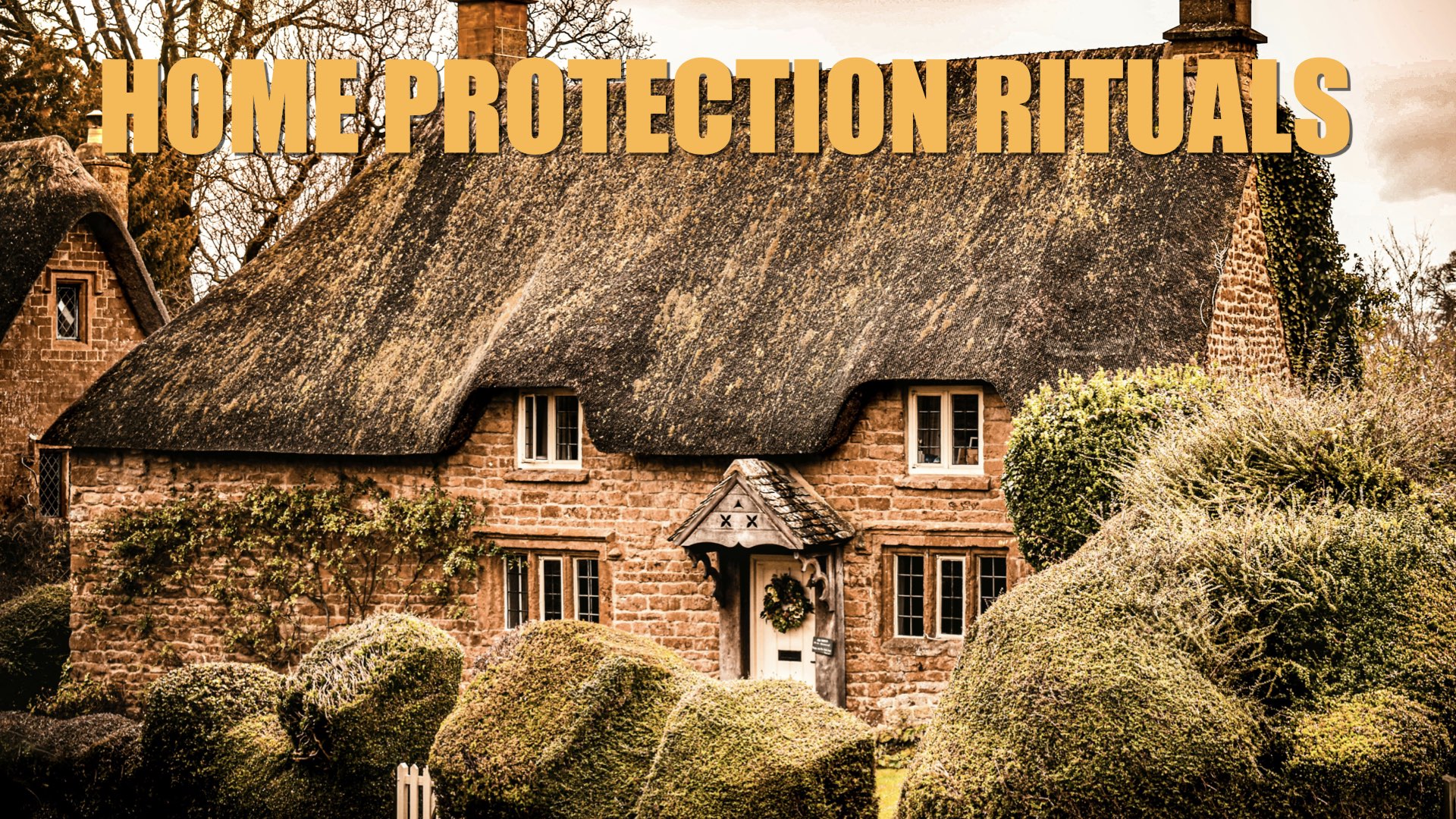Making one’s home a sanctuary and safe haven protected from society’s chaos, negative energy, bad intentions and stress is more important than ever. How to effectively do that is a question we often get, so here we present some hands-on methods and approaches of the ancestors.
Just like for our ancestors our home is more than just a shelter. The expression my home is my castle reflects the idea that a person’s home is supposed to be a place of safety, sanctuary and privacy. The home is a microcosm of the world, reflecting the cosmic order that governs all things.
The home is also a sacred space where the physical and spiritual realms intersect. This can be seen not the least in our modern word vestibule (entrance hall, lobby, antechamber, entry way etc), which shares root with the Indo-European hearth goddess Vesta (Hestia in ancient Greece and Westya among the Proto-Indo-Europeans). This root means something like ’to dwell, inhabit, reside, live’ etc. So the vestibule is what leads in to She who dwells here; the hearth goddess herself. Even more important then to maintain harmony within the home.
Purposelessness, pessimism, financial struggles, energy vampires, stress, unsolved conflicts, division, fear-based narratives, ill-will. So much in society and our daily life can contaminate us with negative energy and spiritual pollution that takes a toll on our well-being. And it’s contagious and spreads to others around us, and to the home itself.
Removing these unseen impurities is to take responsibility for your home and family. We need to reinforce the safety, sanctity, balance and strength of your household. The following provides actionable steps to create a living space where positive energy, health, and harmony flourishes and where we can focus on family life, personal empowerment and spiritual growth. (Most of these practices you’ll be able to learn more about on this platform.)
Improve Yourself
The gods help those who help themselves. One of the most fundamental beliefs in Indo-European paganism is the idea that personal improvement strengthens your hamingja (this is the Norse/Germanic term, but it exists in all branches), a concept akin to personal luck or spiritual power. By performing good deeds, staying true to your responsibilities, and continuously working on self-improvement, you can increase your hamingja. This makes your home safer, happier, and more prosperous. By improving yourself, you naturally enhance the protective energy around your home. Remember, you are responsible not only for yourself but also for your family’s well-being.
Purification & cleansing
Purification rituals are essential to clearing negative energies from your home. Regularly cleanse your living space using methods like sprinkling salt water (considered sacred in many Indo-European traditions), sprinkling holy water (in ancient Greece called khernips), sprinkling so called xádor (ground barley with salt), burning incense, or fumigating with herbs like juniper or sage. Purifying your home before performing rituals or after any significant negative events can help maintain a harmonious environment.
Offerings to the Hearth Goddess
The hearth was the heart of the Indo-European home, and the goddess of the hearth, such as Hestia in Greek tradition or Vesta in Roman tradition (called Westya in Proto-Indo-European), meaning ’she who lives/dwells here’, played a central role in domestic life. To protect your home, make regular offerings to the hearth goddess. This can be as simple as lighting a candle or offering a small portion of your meal to the fire. By honoring the goddess, you invite her protection and blessings into your home. Remember that our word vestibule (entrance hall etc) stems from the same root and obviously means what leads in to the hearth goddess herself.
Daily Offerings to the Divine Kindreds
Daily offerings to the divine kindreds – your ancestors, the gods, land spirits and household/guardian spirits – are a key part of maintaining protection and balance in your home. Protecting the home often began with honoring household and guardian spirits, such as the Roman Lares or the Norse Disir. These spirits were believed to safeguard the family, ensuring well-being and protection from misfortune. Offerings to the land spirits ensure their goodwill and protection. These spirits are the guardians of the land and its natural features. Offerings can be left at specific places in your garden or at the base of your sacred tree. By honoring the land spirits, you align yourself with the natural forces that protect your home. Regularly offer food, drink, incense or other gifts at the hearth, the household altar or out in your garden to show your gratitude and invite their continued blessings. Simple prayers of thanks and requests for protection can also be included.
Threshold Ritual
The threshold of your home is a liminal space, the boundary between the outside world and your sacred living space. Most Indo-European peoples considered the threshold to be guarded by a spirit or deity. Protect your threshold by creating boundaries by practicing mindfulness, and performing a ritual that blesses this boundary. You can sprinkle salt or holy water along the threshold, say a prayer, and invoke protection from the gods and spirits. In some traditions, amulets or protective symbols were placed above or around the door to guard against unwanted energies.
Offering to the spirits of the borders and limits
The borders and boundaries of our properties are sacred spaces and mark the transition between the safety of the home and the unknown beyond. They are therefore especially vulnerable to negative forces. These boundaries are inhabited or watched over by spirits or deities who safeguard the household and its members. To honor and appease these spirits, perform sacrifices, involving offerings of food, wine, milk, water or animal sacrifices, at the edges of your land or at specific boundary markers. Our ancestors also arranged festivals to the honor of the spirits of the borders, and often garlanded the cornerstones. By doing so, you gain the favor of these spirits, ensuring that any negative forces or harmful entities are kept at bay. This practice creates a protective barrier around the home, securing the well-being and prosperity of the family, and reinforces the sense of harmony and security within our property. It should also be added that a land-taking ritual should be performed when you first move in.
Land-Taking Ritual
When you move to a new place, perform a land-taking ritual to establish your presence and claim the space with respect. This involves walking the boundaries of your property carrying your domestic fire, offering thanks to the land spirits (genius loci), and asking for their protection. Marking the boundaries with sacred symbols or burying small offerings at each corner of your land are traditional ways to affirm your connection to the land. You will also be able to find a full land-taking ritual here on Hamingja.
Herbs & plants
Herbs and plants were used in Indo-European cultures for both their physical and spiritual protective qualities. Sacred plants like juniper, oak, and sage were burned to purify the air and drive out malevolent spirits, while others like vervain and rowan were hung over doorways or windows to prevent negative energy from entering. These plants were often considered gifts from the gods, imbued with divine protection. By incorporating sacred herbs into daily life—whether by burning them, planting them around the home, or carrying them in small charms—people sought to ward off harm and ensure the home remained a place of peace and vitality.
Sprinkle with Holy Water
Sprinkling holy water throughout your home is another common practice for protection. Holy water, which can be blessed by invoking the gods or made by infusing water with salt and prayers, is used to purify and sanctify the space. This simple act drives away negativity and invites protective forces into your home. Here on the platform you’ll find a video on how to make holy water.
Door Amulets
Amulets were commonly used by Indo-European peoples to protect the home from harm. These could include woolen cords, objects that had been part of rituals (like ashes from a sacred fire), or carved symbols. Hang these amulets on or near your doors to prevent negative energies or malevolent spirits from entering. For example, in some traditions, a piece of iron was hung over the door to ward off evil.
Neighborliness
Our ancestors were often kin with their neighbors, which of course increases security, frith and good intentions. That’d be a tall order today, but a good way to keep your surroundings full of positive vibes is to get to know your neighbors, be hospitable, generous, and also make a deal that you’ll keep an eye out if they do the same. Creating so called guest-friendships by inviting each other and with gift-giving was (and is) a great way to create safer surroundings.
Plant a Sacred Guardian Tree
In many Indo-European traditions, a vårdträd (Swedish/Scandinavian for guardian tree) was planted on one’s land to act as a protector. This tree was believed to house protective spirits and connect the household to the natural world. Choose a tree species that resonates with you or has local significance and plant it with reverence, offering prayers or small gifts to the spirits of the land as you do so. This might not be for everyone, but if you have a garden or bigger property it’s a great idea. Let it stand there generation after generation.



